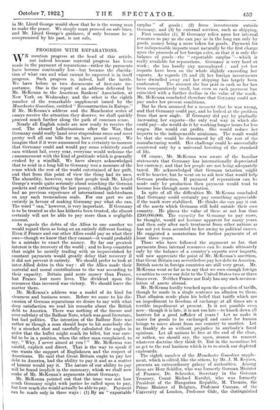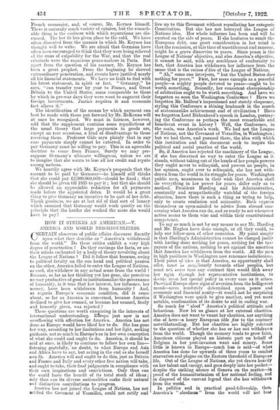PROGRESS WITH REPARATIONS.
WE mention progress at the head of this article, . not indeed because material progress has been made in the payment of reparations—rather the payments have become continually less—but because the elucida- tion of what can and what cannot be expected is in itself progress. Such progress is, indeed, half the battle. We have before us two documents of first-rate im- portance. One is the report of an address delivered by Mr. McKenna to the American Bankers' Association, at New York, on Wednesday, and the other is the eighth number of the remarkable supplement issued by the Manchester Guardian, entitled" Reconstruction in Europe." If Mr. McKensa's address and the Manchester series of essays receive the attention they deserve, we shall quickly proceed much further along the path of common sense. Nearly all English minds are now ready to receive the seed. The absurd hallucinations after the War, that Germany could really hand over stupendous sums and meet pretty well all our bills for us, have passed away. We imagine that if it were announced for a certainty to-morrow that Germany could and would pay some relatively small sum without fail, every year, everyone would welcome the announcement with the kind of gratitude which is generally evoked by a windfall. We have always acknowledged that to send in a long bill to Germany was a measure of the sense which the rest of the world entertained of her guilt, and that from this point of view the thing had its uses. The absurdity, however, was that people took Mr. Lloyd George's words quite seriously about searching the German pockets and extracting the last penny, although the world had no previous experience of international indebtedness on any such tremendous scale. For our part we are entirely in favour of making Germany pay what she can. The word " can," however, is very important. If Germany is to be treated as she has hitherto been treated, she almost certainly will not be able to pay more than a negligible amount.
As regards the debts of the Allies to one another we would regard them as being on an entirely different footing. Even if France and our other Allies could pay us what they owe—though we know that they cannot—it would probably be a mistake to exact the money. By far our greatest interest is the recovery of the world ; and to keep countries that might be merrily trading with us impoverished by constant payments would greatly delay that recovery if it did not prevent it entirely. We should prefer to look at inter-Allied, debts in this way: all the Allies made their material and moral contributions to the war according to their capacity. Britain paid more money than France, but France lost more lives. The dividend upon the resources thus invested was victory. We should leave the matter there.
Mr. McKenna's address was a model of its kind for clearness and business sense. Before we come to his dis- cussion of German reparations we desire to say with what deep satisfaction we read his remarks about the British debt to America. There was nothing of the finesse and over-subtlety of the Balfour Note, which was good literature, but bad politics. The intention of the Balfour Note was rather as though a man should hope to hit somebody else by a ricochet shot and carefully calculated the angles in order that the bullet might reach its billet, but was care- ful to be in a position, when the other man complained, to say, "Why, I never aimed at you ! " Mr. McKenna was candid, explicit and direct. That is the way to speak if one wants the support of Englishmen and the respect of Americans. He said that Great Britain ought to pay her debt to America, had the ability to pay it and as a matter of honour would pay it. The nature of our ability to pay will be found implicit in the summary, whith we shall now make of Mr. McKenna's arguments about Germany. Mr. McKenna pointed out that the issue was not how much Germany might with justice be called upon to pay, but how much she windd actually be able to pay. Payment can be made only in three ways : (1) By an "exportable surplus of goods ; (2) from investments outside Germany, and (3) by external services, such as shipping. First consider (1). If Germany relies upon her internal resources to pay us she can pay us in the long run only by goods, money being a mere token for goods. Payment for her indispensable imports must naturally be the first charge upon the proceeds of her foreign sales, so that it is only the balance of goods—the "exportable surplus "—which is really available for reparations. Germany is very hard at work; she has hardly any unemployed ; and yet her imports have been on the whole slightly exceeding her exports. As regards (2) and (3) her foreign investments have dwindled away and her shipping has largely been confiscated. The amount she has paid in cash so far has been comparatively small, but even so each payment has coincided with a further decline in the value of the mark. Mr. McKenna concluded therefore that Germany could not pay under her present conditions.
But he then assumed for a moment that he was wrong, and that Germany could pay, and he looked at the problem from that new angle. If Germany did pay by gradually increasing her exports—the only real way in which she could pay—she would do it by working longer hours for less wages. She would cut profits. She would reduce her imports to the indispensable minimum. The result would be that she would be denounced by all the rest of the manufacturing world. Her challenge could be successfully countered only by a universal lowering of the standard of life.
Of course, Mr. McKenna was aware of the familiar statements that Germany has internationally depreciated her currency, and that her people are not being adequately taxed. He acknowledged that German taxation might well be heavier, but he went on to ask how that would help German production. If payment of reparations can be made only by production then payment would tend to become less through more taxation.
In spite of all the difficulties Mr. McKenna concluded that Germany could certainly pay something appreciable if the mark were stabilized. He thinks she can pay it out of the assets which Germans still hold outside their own country. He places the value of these at not less than £200,000,000. The capacity for Germany to pay more, he thought, would not become apparent for many years, and then only after such treatment from other nations as has not yet been accorded to her owing to political causes. He suggested a moratorium for further payments of at least three years.
Those who have followed the argument so far, that payments from internal resources can be made ultimately only by the balance of a country's exports over imports, will now appreciate the point of Mr. McKenna's assertion, that Great Britain can nevertheless pay her debt to America.
British assets in foreign countries are still very great. Mr. McKenna went so far as to say that we own enough foreign securities to cover our debt to the United States two or three times over. Neither France nor Italy has any such accumu- lation of assets abroad.
Mr. McKenna hardly touched upon the question of tariffs, though he made in a single sentence an allusion to them.
That allusion made plain his belief that tariffs which are an impediment to freedom of exchange at all times are a terrible impediment at present. Is it not possible even now—though it is late, it is not too late—to knock down all barriers for a good nu!hiber of years ? Let us make it easier for goods to be exchanged and easier for human beings to move about from one country to another. Let us frankly do so without prejudice to anybody's fiscal opinions. Let all nations be free at the end of the close, or rather, we should say, the open, season to reassert whatever doctrine they think fit. But in the meantime let us get to the real business which is to re-stock our depleted cupboards. The eighth number of the Manchester Guardian supple- ment, which is edited, like the others, by Mr. J. M. Keynes, presents an extraordinary galaxy of authorities. Among them are Herr Schiffer, who was formerly German Minister of Finance, Dr. Schroeder, Secretary in the German Treasury, Count Michael Karolyi, who was formerly President of the Hungarian Republic, M. Theums, the Prime Minister of Belgium, Professor Cannan, of the University of London, Professor Gide, the distinguished French economist, and, of course, Mr. Keynes himself. There is naturally much variety of opinion, but the remark- able thing is the coolness with which reparations are dis- cussed. The hot fit has given place to the cold. We have often dissented from the manner in which Mr. Keynes has thought well to write. We are afraid that Germans have often been encouraged to think that they were being relieved of the onus of culpability for the War, and that the real criminals were the rapacions peace-makers in Paris. But apart from the question of his manner, Mr. Keynes has been a great prophet. From the beginning he showed extraordinary penetration, and events have justified nearly all his financial statements. We have no fault to find with his latest statement, in spirit or fact. "Germany," he says, "can transfer year by year to France, and Great Britain to the United States, sums comparable to those by which in pre-war daye they were wont to augment their foreign investments. Justice requires it and economic fact allows it."
The identification of the means by which payment can best be made with those put forward by Mr. McKenna will at once be recognized. We must in fairness, however, add that the supplement contains some repudiations of the usual theory that large payments in goods are, except on rare occasions, a kind of disadvantage to those receiving them. Professor Gide says plainly that in any case payments simply cannot be extorted. In order to pay Germany must be willing to pay. This is an agreeable doctrine to come from France. Surely we may pre- suppose Germany's ultimate willingness, unless we are to imagine that she wants to lose all her credit and repute among nations.
We heartily agree with Mr. Keynes's proposals that the amount to be paid by Germany—he himself still thinks that she could pay £2,000,000,000—should be fixed ; that she should be given till 1935 to pay it ; but that she should be allowed an appreciable reduction for all payments made before the appointed dates. It would be a great thing to give Germany an incentive to be quit of her debt. Thank goodness, we are at last rid of that sort of lunacy which assumed that Germany would work quietly on the principle that the harder she worked the more she would have to pay !







































 Previous page
Previous page